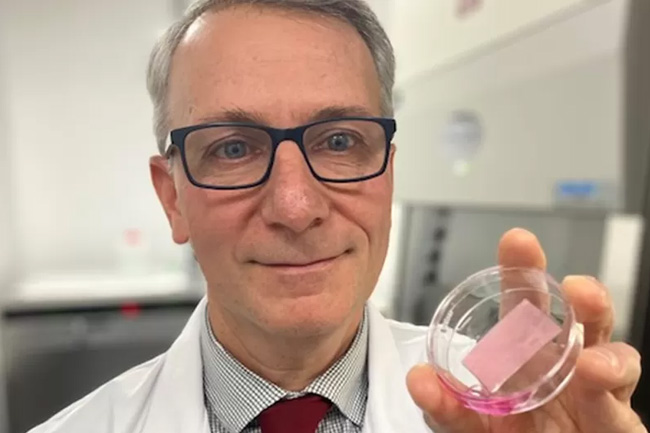Baby’s life ‘probably saved’ by umbilical stem cells
December 20, 2022 01:25 pm
A heart surgeon says he “probably saved the life” of a baby by carrying out a “world-first” operation using stem cells from placentas.
Professor Massimo Caputo from the Bristol Heart Institute used pioneering stem cell “scaffolding” to correct baby Finley’s heart defect.
He hopes to develop the technology so children born with congenital cardiac disease won’t need as many operations.
Finley, now two, is “now a happy growing little boy”.
But he was born with the main arteries in his heart the wrong way round and at just four days old had his first open-heart surgery at Bristol Royal Hospital for Children.
Unfortunately, the surgery didn’t solve the problem and his heart function deteriorated significantly, with the left side of the heart suffering from a severe lack of blood flow.
His mother, Melissa, from Corsham, in Wiltshire, said: “We were prepared from the start that the odds of him surviving were not good.
“After 12 hours, Finley finally came out of surgery but he needed a heart and lung bypass machine to keep alive, and his heart function had deteriorated significantly.”
After weeks in intensive care it looked like there was no conventional way to treat Finley’s condition and he was reliant on drugs to keep his heart going.
But a new procedure was tried, involving stem cells from a placenta bank.
Prof Caputo injected the cells directly into Finley’s heart in the hope they would help damaged blood vessels grow.
The so-called “allogenic” cells were grown by scientists at the Royal Free Hospital in London, and millions of them were injected into Finley’s heart muscle.
Allogenic cells have the ability to grow into tissue that is not rejected and in Finley’s case, have regenerated damaged heart muscle.
“We weaned him from all the drugs he was on, we weaned him from ventilation,” said Prof Caputo.
“He was discharged from ITU and is now a happy growing little boy.”
Using a bio-printer, a stem cell scaffold is made to repair abnormalities to valves in blood vessels, and to mend holes between the two main pumping chambers of the heart.
Artificial tissue is normally used used on babies for cardiac repairs, but it can fail and it doesn’t grow with the heart, so as the children grow, they require more operations.
Prof Caputo hopes a clinical trial on the patches will happen in the next two years, after successful laboratory work.
The trial of the stem cell plasters offers hope for patients like Louie from Wales, who has a number of congenital heart defects.
The 13-year-old from Cardiff had his first open heart surgery with Prof Caputo at just two weeks’ old and then again aged four to replace the material fixing his heart.
But because the materials aren’t completely biological, they are unable to grow with him and he needs repeat operations.
Like Louie, every day in the UK, around 13 babies are diagnosed with a congenital heart defect - a heart condition that develops before the baby is born, according to the British Heart Foundation.
Because the materials used to fix the heart can be rejected by the patient’s immune system, they can cause scarring in the heart that can lead to other complications, and can gradually break down and fail in just a few months or years.
A child might therefore have to go through the same heart operation multiple times throughout its childhood- around 200 repeat operations for congenital heart defects are carried out every year in the UK.
Louie hopes the breakthrough means the number of operations he faces will be significantly reduced thanks to the stem cell technology and tissues able to grow with his body.
“I don’t like having the procedures,” he said.
“It’s not good in the long term, knowing every couple of years I need an operation so that would make me a lot more relaxed.”
Prof Caputo and his team say the stem cell technology could save the NHS an estimated £30,000 for every operation no longer needed, saving millions of pounds each year.
Dr Stephen Minger, an expert in stem cell biology and director of SLM Blue Skies Innovations Ltd, applauded the research.
He said: “Most studies that I am aware of in adults with heart dysfunction or failure show only minimal therapeutic benefit with stem cell infusion.
“I’m happy that the clinical team will go on to do a standard clinical trial which should tell us if this was a ‘one-off’ success and also give us some better understanding of mechanisms behind this.”
Source - BBC
-Agencies














